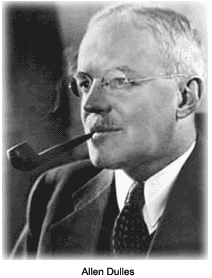Allen Dulles was the first civilian director of the Central Intelligence Agency (CIA) from 1953 to 1961, and also was a member of the Warren Commission.
 Family and education
Allen Welsh Dulles was born on April 7, 1893, to a Presbyterian minister, in Watertown, New York. Allen was the grandson of a secretary of state. Growing up in a household that valued public service, Allen was exposed to that common topic of conversation.
In 1916, Dulles graduated from Princeton University, then entered the diplomatic service. He earned a law degree from George Washington University while serving in the diplomatic corps. He graduated in 1926 and took a job at a New York law firm where his brother, John Foster Dulles, was a partner.
Family and education
Allen Welsh Dulles was born on April 7, 1893, to a Presbyterian minister, in Watertown, New York. Allen was the grandson of a secretary of state. Growing up in a household that valued public service, Allen was exposed to that common topic of conversation.
In 1916, Dulles graduated from Princeton University, then entered the diplomatic service. He earned a law degree from George Washington University while serving in the diplomatic corps. He graduated in 1926 and took a job at a New York law firm where his brother, John Foster Dulles, was a partner.
A taste of intelligence During World War II Dulles was given the role of station chief of the newly formed Office of Strategic Services (OSS)in Berne, Switzerland, in 1942. The OSS was the predecessor of the Central Intelligence Agency. Dulles was given information by Fritz Kolbe, a German diplomat and foe of the Nazis. Kolbe searched out Americans to pass on vital information about the Germans. Kolbe supplied documents to Dulles that revealed German spies, and plans to build the Messerschmitt Me 262 jet fighter. The CIA In 1947, Congress created the Central Intelligence Agency (CIA) as part of the National Security Act. Dulles had been closely involved with its development. In 1951, he was named as CIA`s deputy director. In 1953, he became the director under President Dwight D. Eisenhower; all of the previous directors had been military officers. The CIA’s covert operations were an important part of the Eisenhower administration and the Cold War national security policy known as the "New Look." According to that policy, the country`s defense would rely on nuclear weapons and air power to threaten massive retaliation against communist aggression. The agency played a large part in the overthrow of the Iranian government in 1953 and the Guatemalan government in 1954. Allen Dulles viewed that kind of activity as an essential part of the Cold War struggle against communism, although it did not always comply with the law. Eisenhower agreed with Dulles. Dulles faced growing criticism during the Kennedy Administration, particulary concerning the involvement by the CIA in the failed Bay of Pigs Invasion of 1961. President John F. Kennedy held Dulles responsible, and from increasing pressure, Dulles resigned from the CIA. He believed the operation would have been successful if the president had authorized sufficient military support. The Warren Commission In 1963, Dulles published a book, The Craft of Intelligence. Later that year, President Lyndon B. Johnson appointed him as one of seven members of the Warren Commission, to investigate the assassination of President John F. Kennedy. Despite his knowledge of several assassination plots by the CIA against Cuba`s Fidel Castro, possibly implicating Castro in the assassination, there was no mention of those plots during the Warren Commission investigation. On January 29, 1969, Dulles died of Influenza, complicated by pneumonia, in Washington, D.C.